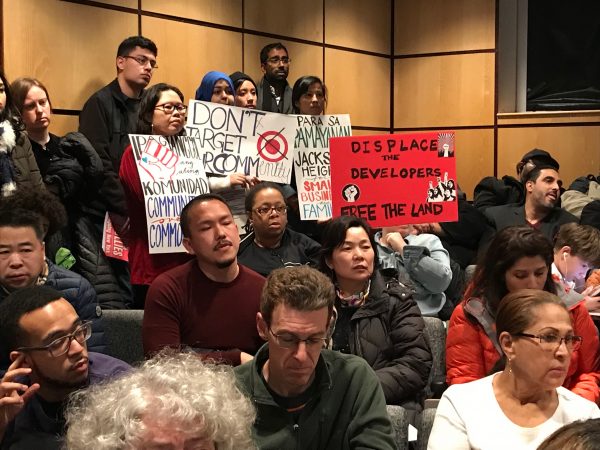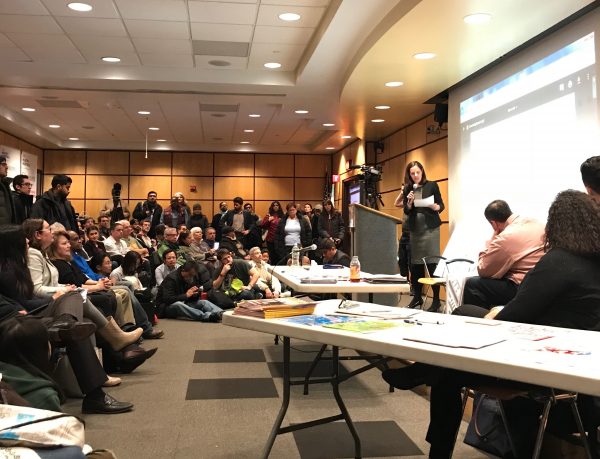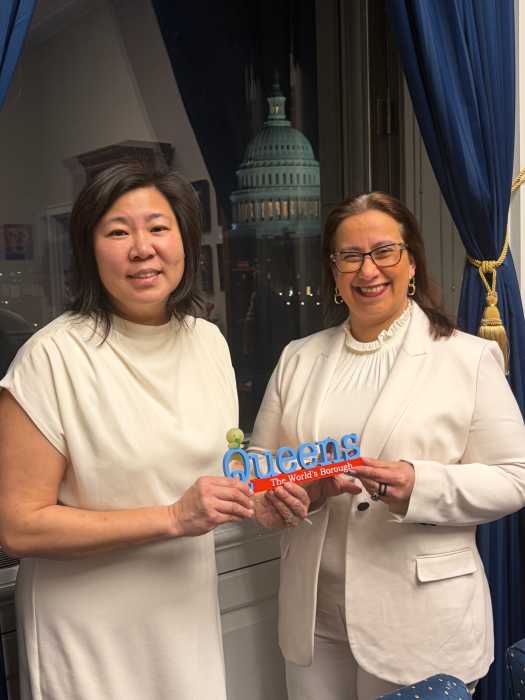
Community members protest the rezoning
March 14, 2018 By Tara Law
Queens Community Board 4, which covers Elmhurst and Corona, rejected a spot rezoning application on Tuesday that would permit a developer to construct a 13-story building on 82nd Street.
The board issued their decision after listening to an impassioned town hall meeting, in which residents and local business owners begged the board to halt the project and prevent its potentially gentrifying impact on the neighborhood.
The community board’s advisory vote will be considered by the Borough President and other City officials as the application process continues. If ultimately approved by the City, the proposal would bring a small Target, nine stories of apartments and 128 parking spaces into the neighborhood.
The community board voted down the proposal during a meeting immediately following a public hearing in an Elmhurst Hospital auditorium. They also issued a recommendation to downzone the property as it stands now, to further minimize the impact of what could be built there.
The developers, Sun Equity Partners and Heskel Group, have a right to build a 10-story, 113 foot tall building at 40-31 82nd St without rezoning. The building would have a single-story commercial space and 77 market-rate apartment units across nine residential floors.
With rezoning, the building could rise 13 stories and be 145 feet tall. The building would have 120 units across 11 residential floors, 30 percent of which would be affordable housing under the developer’s current plan.
Dozens of community members stood before a crowd of approximately 200 people and argued for nearly three hours that the development will drive up real estate prices, force out small businesses and increase crowding in the neighborhood. Concerned community members sat on the floor and stood in the aisles to observe the meeting or to wait for their turn to speak.
Though community members raised many different problems that they see with the development, were united in opposing it. Board Chairperson Damian Vargas repeatedly asked the attendees to remain quiet, but the crowd frequently broke into chanting and applause.
A number of residents expressed concerns with rising costs in the neighborhood, including Daria Matos. Matos said that she has lived in the neighborhood for 30 years, but has decided that remaining in the area is untenable.

A representative from Sun Equity Partners presents the developer’s proposal
“Me and my husband would love to raise our children here, but unfortunately we cannot,” said Matos. “We cannot afford to buy an apartment, we cannot afford to buy a home here.”
Residents also complained about crowding on public transportation, in local schools and on the neighborhood’s streets. Jomarie Cruz, a nurse at Elmhurst Hospital, said that she worried ambulances carrying mothers in labor would be held up in traffic.
Several business owners talked about their concerns that incoming corporate businesses would force out family-owned stores in the area.
A man speaking through a translator gave his name as Zang and said that he was the owner of New J & B Thrift Shop. Zang said that he is concerned about competition from Target, and explained that his business supports his children and several other families.
“As a small business owner, this is truly a detriment to his business, to his children, to the community,” the translator said.
Ultimately, a majority of the community board agreed to deny the application and motioned to downzone the property.
However, several members of the community board expressed frustration that their board can only make a recommendation on the rezoning, and cannot prevent the application from going forward.
Community boards serve an advisory role, and can only make a recommendation to legislators and officials about rezoning proposals. The board will submit its decision the Borough President, who will consider the application along with the City Planning Commission, the City Council and finally the Mayor.
The board is also unable to block the new Target, which has already signed a lease with the developer.
“Regardless of whether we vote yes or we vote no—I’m not saying that it’s out of our hands and it’s over now—but Target is coming,” said Chairperson Vargas.
The board members discussed submitting a package of additional recommendations with the denial in the event that the rezoning is approved by the City.
These recommendations may include asking the developer to reconfigure its plans for affordable housing to make more of the housing available to families with lower incomes. The affordable housing rates were set by the city under the Mandatory Inclusionary Housing law.
The developer has currently agreed to an affordable housing configuration that would designate 30 percent of the apartments as affordable, or about 36 units, if the property is rezoned. These units would be available to families of three making an average of 80 percent AMI, or $65,000.
The inclusionary housing plan would make 20 percent of the apartment units affordable housing, or about 24 units. These units would be available to families of three making an average of 40 percent of the AMI, or about $33,000.


































